Ethical Research with Indigenous Australians and Intervention Design
VerifiedAdded on 2023/06/15
|8
|2729
|130
Essay
AI Summary
This essay delves into several key aspects of psychological research. It begins by asserting the scientific method as the optimal approach for answering questions, explaining causal relationships, and evaluating treatment effectiveness. The essay then discusses the best designs for intervention studies, using a hypothetical study to illustrate the principles of randomized controlled trials. It emphasizes the importance of reliability and validity in psychological measurement, providing examples to clarify these concepts. Finally, the essay addresses the ethical challenges in conducting research with Australian Indigenous populations, highlighting issues such as anonymity, confidentiality, and informed consent, and suggests culturally responsive approaches to ensure ethical research practices. Desklib offers a wealth of similar solved assignments and study resources for students.
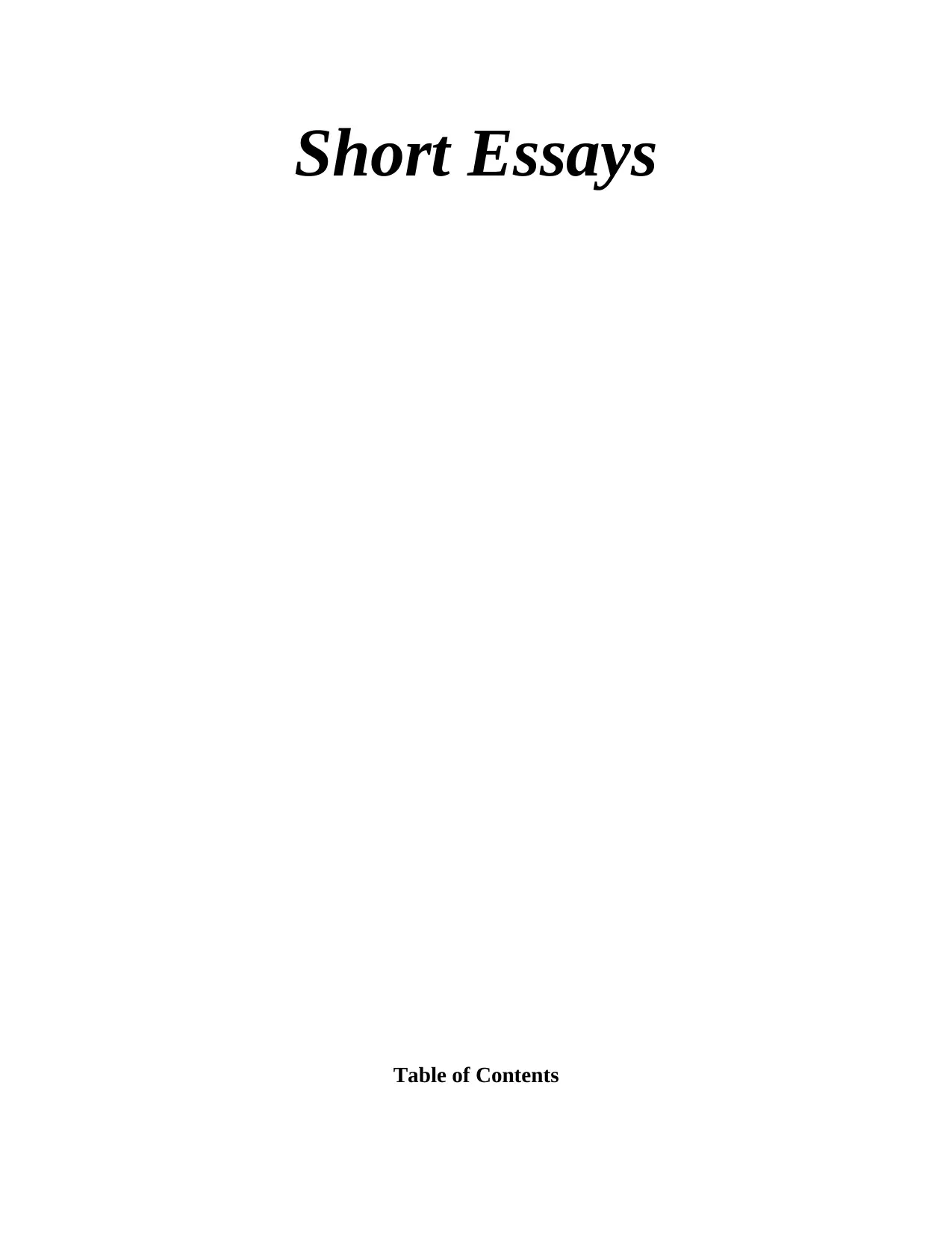
Short Essays
Table of Contents
Table of Contents
Paraphrase This Document
Need a fresh take? Get an instant paraphrase of this document with our AI Paraphraser
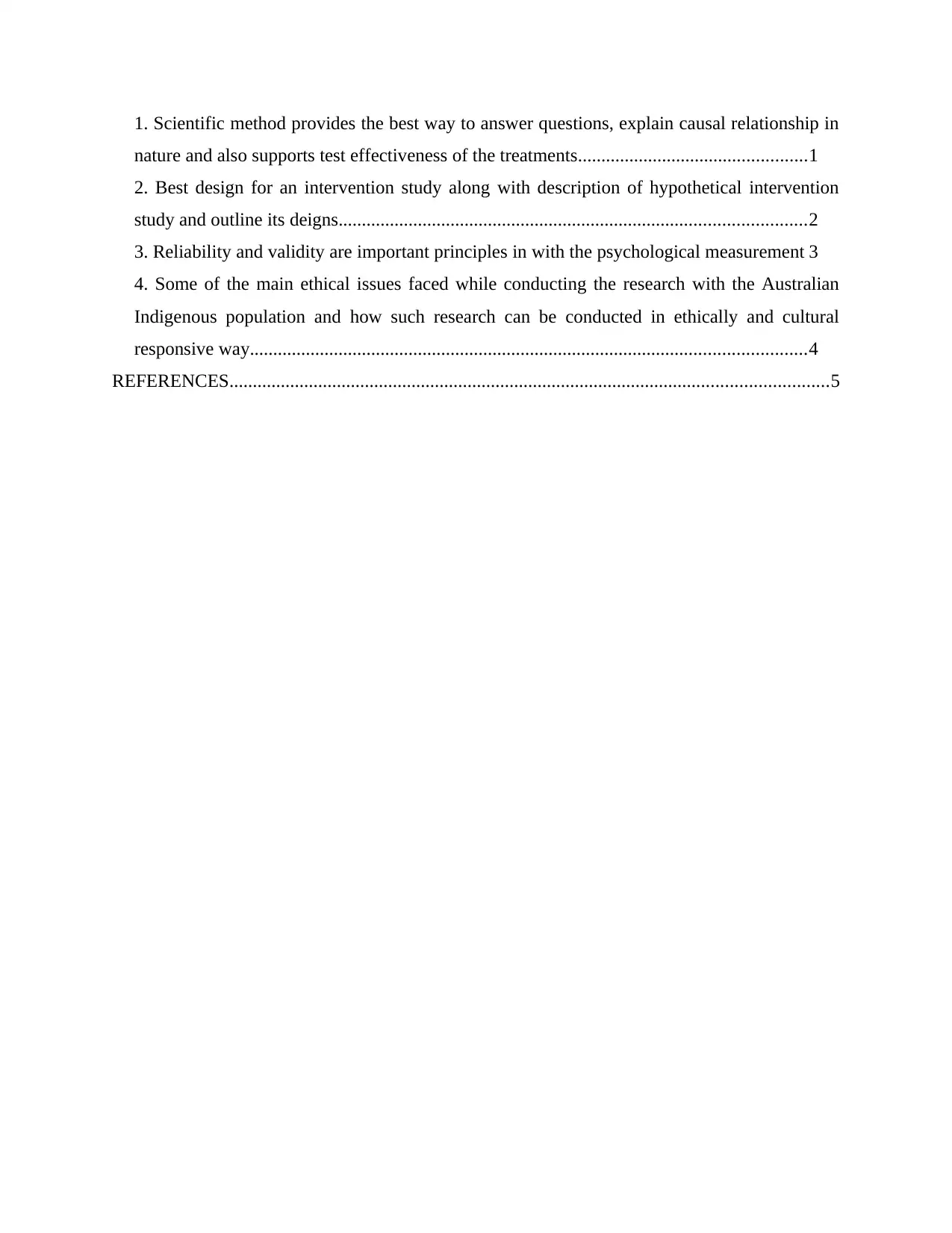
1. Scientific method provides the best way to answer questions, explain causal relationship in
nature and also supports test effectiveness of the treatments.................................................1
2. Best design for an intervention study along with description of hypothetical intervention
study and outline its deigns....................................................................................................2
3. Reliability and validity are important principles in with the psychological measurement 3
4. Some of the main ethical issues faced while conducting the research with the Australian
Indigenous population and how such research can be conducted in ethically and cultural
responsive way.......................................................................................................................4
REFERENCES................................................................................................................................5
nature and also supports test effectiveness of the treatments.................................................1
2. Best design for an intervention study along with description of hypothetical intervention
study and outline its deigns....................................................................................................2
3. Reliability and validity are important principles in with the psychological measurement 3
4. Some of the main ethical issues faced while conducting the research with the Australian
Indigenous population and how such research can be conducted in ethically and cultural
responsive way.......................................................................................................................4
REFERENCES................................................................................................................................5
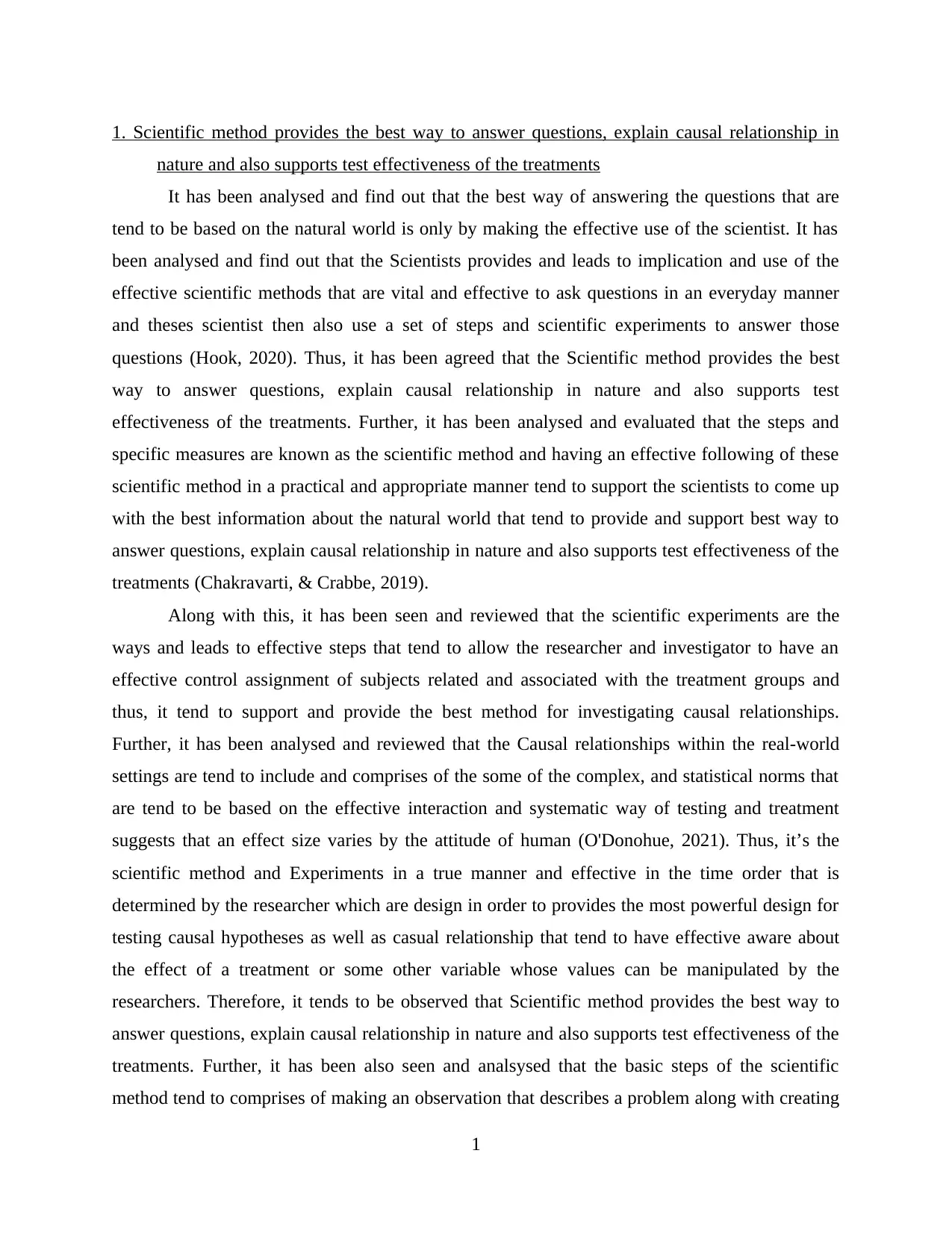
1. Scientific method provides the best way to answer questions, explain causal relationship in
nature and also supports test effectiveness of the treatments
It has been analysed and find out that the best way of answering the questions that are
tend to be based on the natural world is only by making the effective use of the scientist. It has
been analysed and find out that the Scientists provides and leads to implication and use of the
effective scientific methods that are vital and effective to ask questions in an everyday manner
and theses scientist then also use a set of steps and scientific experiments to answer those
questions (Hook, 2020). Thus, it has been agreed that the Scientific method provides the best
way to answer questions, explain causal relationship in nature and also supports test
effectiveness of the treatments. Further, it has been analysed and evaluated that the steps and
specific measures are known as the scientific method and having an effective following of these
scientific method in a practical and appropriate manner tend to support the scientists to come up
with the best information about the natural world that tend to provide and support best way to
answer questions, explain causal relationship in nature and also supports test effectiveness of the
treatments (Chakravarti, & Crabbe, 2019).
Along with this, it has been seen and reviewed that the scientific experiments are the
ways and leads to effective steps that tend to allow the researcher and investigator to have an
effective control assignment of subjects related and associated with the treatment groups and
thus, it tend to support and provide the best method for investigating causal relationships.
Further, it has been analysed and reviewed that the Causal relationships within the real-world
settings are tend to include and comprises of the some of the complex, and statistical norms that
are tend to be based on the effective interaction and systematic way of testing and treatment
suggests that an effect size varies by the attitude of human (O'Donohue, 2021). Thus, it’s the
scientific method and Experiments in a true manner and effective in the time order that is
determined by the researcher which are design in order to provides the most powerful design for
testing causal hypotheses as well as casual relationship that tend to have effective aware about
the effect of a treatment or some other variable whose values can be manipulated by the
researchers. Therefore, it tends to be observed that Scientific method provides the best way to
answer questions, explain causal relationship in nature and also supports test effectiveness of the
treatments. Further, it has been also seen and analsysed that the basic steps of the scientific
method tend to comprises of making an observation that describes a problem along with creating
1
nature and also supports test effectiveness of the treatments
It has been analysed and find out that the best way of answering the questions that are
tend to be based on the natural world is only by making the effective use of the scientist. It has
been analysed and find out that the Scientists provides and leads to implication and use of the
effective scientific methods that are vital and effective to ask questions in an everyday manner
and theses scientist then also use a set of steps and scientific experiments to answer those
questions (Hook, 2020). Thus, it has been agreed that the Scientific method provides the best
way to answer questions, explain causal relationship in nature and also supports test
effectiveness of the treatments. Further, it has been analysed and evaluated that the steps and
specific measures are known as the scientific method and having an effective following of these
scientific method in a practical and appropriate manner tend to support the scientists to come up
with the best information about the natural world that tend to provide and support best way to
answer questions, explain causal relationship in nature and also supports test effectiveness of the
treatments (Chakravarti, & Crabbe, 2019).
Along with this, it has been seen and reviewed that the scientific experiments are the
ways and leads to effective steps that tend to allow the researcher and investigator to have an
effective control assignment of subjects related and associated with the treatment groups and
thus, it tend to support and provide the best method for investigating causal relationships.
Further, it has been analysed and reviewed that the Causal relationships within the real-world
settings are tend to include and comprises of the some of the complex, and statistical norms that
are tend to be based on the effective interaction and systematic way of testing and treatment
suggests that an effect size varies by the attitude of human (O'Donohue, 2021). Thus, it’s the
scientific method and Experiments in a true manner and effective in the time order that is
determined by the researcher which are design in order to provides the most powerful design for
testing causal hypotheses as well as casual relationship that tend to have effective aware about
the effect of a treatment or some other variable whose values can be manipulated by the
researchers. Therefore, it tends to be observed that Scientific method provides the best way to
answer questions, explain causal relationship in nature and also supports test effectiveness of the
treatments. Further, it has been also seen and analsysed that the basic steps of the scientific
method tend to comprises of making an observation that describes a problem along with creating
1
⊘ This is a preview!⊘
Do you want full access?
Subscribe today to unlock all pages.

Trusted by 1+ million students worldwide
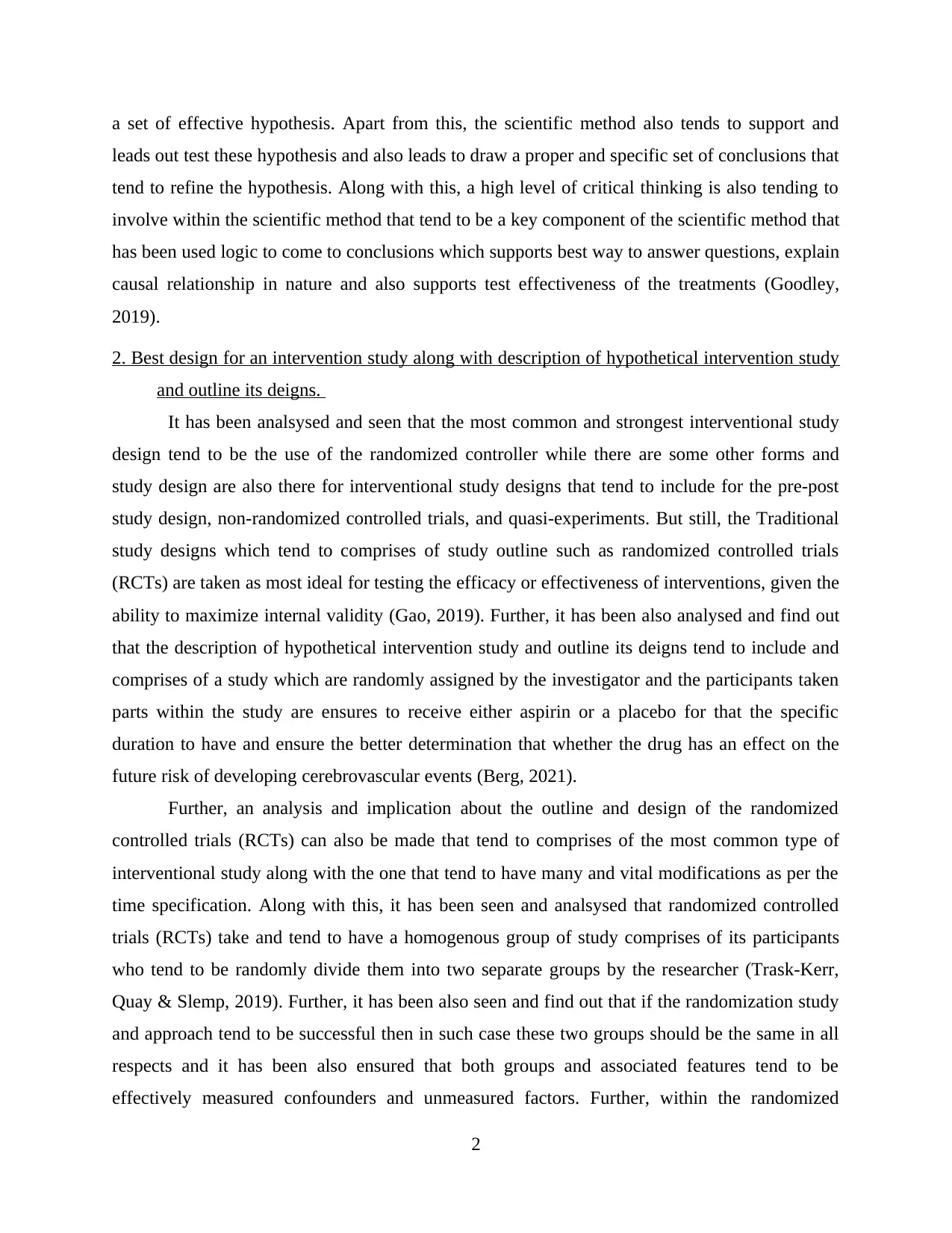
a set of effective hypothesis. Apart from this, the scientific method also tends to support and
leads out test these hypothesis and also leads to draw a proper and specific set of conclusions that
tend to refine the hypothesis. Along with this, a high level of critical thinking is also tending to
involve within the scientific method that tend to be a key component of the scientific method that
has been used logic to come to conclusions which supports best way to answer questions, explain
causal relationship in nature and also supports test effectiveness of the treatments (Goodley,
2019).
2. Best design for an intervention study along with description of hypothetical intervention study
and outline its deigns.
It has been analsysed and seen that the most common and strongest interventional study
design tend to be the use of the randomized controller while there are some other forms and
study design are also there for interventional study designs that tend to include for the pre-post
study design, non-randomized controlled trials, and quasi-experiments. But still, the Traditional
study designs which tend to comprises of study outline such as randomized controlled trials
(RCTs) are taken as most ideal for testing the efficacy or effectiveness of interventions, given the
ability to maximize internal validity (Gao, 2019). Further, it has been also analysed and find out
that the description of hypothetical intervention study and outline its deigns tend to include and
comprises of a study which are randomly assigned by the investigator and the participants taken
parts within the study are ensures to receive either aspirin or a placebo for that the specific
duration to have and ensure the better determination that whether the drug has an effect on the
future risk of developing cerebrovascular events (Berg, 2021).
Further, an analysis and implication about the outline and design of the randomized
controlled trials (RCTs) can also be made that tend to comprises of the most common type of
interventional study along with the one that tend to have many and vital modifications as per the
time specification. Along with this, it has been seen and analsysed that randomized controlled
trials (RCTs) take and tend to have a homogenous group of study comprises of its participants
who tend to be randomly divide them into two separate groups by the researcher (Trask-Kerr,
Quay & Slemp, 2019). Further, it has been also seen and find out that if the randomization study
and approach tend to be successful then in such case these two groups should be the same in all
respects and it has been also ensured that both groups and associated features tend to be
effectively measured confounders and unmeasured factors. Further, within the randomized
2
leads out test these hypothesis and also leads to draw a proper and specific set of conclusions that
tend to refine the hypothesis. Along with this, a high level of critical thinking is also tending to
involve within the scientific method that tend to be a key component of the scientific method that
has been used logic to come to conclusions which supports best way to answer questions, explain
causal relationship in nature and also supports test effectiveness of the treatments (Goodley,
2019).
2. Best design for an intervention study along with description of hypothetical intervention study
and outline its deigns.
It has been analsysed and seen that the most common and strongest interventional study
design tend to be the use of the randomized controller while there are some other forms and
study design are also there for interventional study designs that tend to include for the pre-post
study design, non-randomized controlled trials, and quasi-experiments. But still, the Traditional
study designs which tend to comprises of study outline such as randomized controlled trials
(RCTs) are taken as most ideal for testing the efficacy or effectiveness of interventions, given the
ability to maximize internal validity (Gao, 2019). Further, it has been also analysed and find out
that the description of hypothetical intervention study and outline its deigns tend to include and
comprises of a study which are randomly assigned by the investigator and the participants taken
parts within the study are ensures to receive either aspirin or a placebo for that the specific
duration to have and ensure the better determination that whether the drug has an effect on the
future risk of developing cerebrovascular events (Berg, 2021).
Further, an analysis and implication about the outline and design of the randomized
controlled trials (RCTs) can also be made that tend to comprises of the most common type of
interventional study along with the one that tend to have many and vital modifications as per the
time specification. Along with this, it has been seen and analsysed that randomized controlled
trials (RCTs) take and tend to have a homogenous group of study comprises of its participants
who tend to be randomly divide them into two separate groups by the researcher (Trask-Kerr,
Quay & Slemp, 2019). Further, it has been also seen and find out that if the randomization study
and approach tend to be successful then in such case these two groups should be the same in all
respects and it has been also ensured that both groups and associated features tend to be
effectively measured confounders and unmeasured factors. Further, within the randomized
2
Paraphrase This Document
Need a fresh take? Get an instant paraphrase of this document with our AI Paraphraser
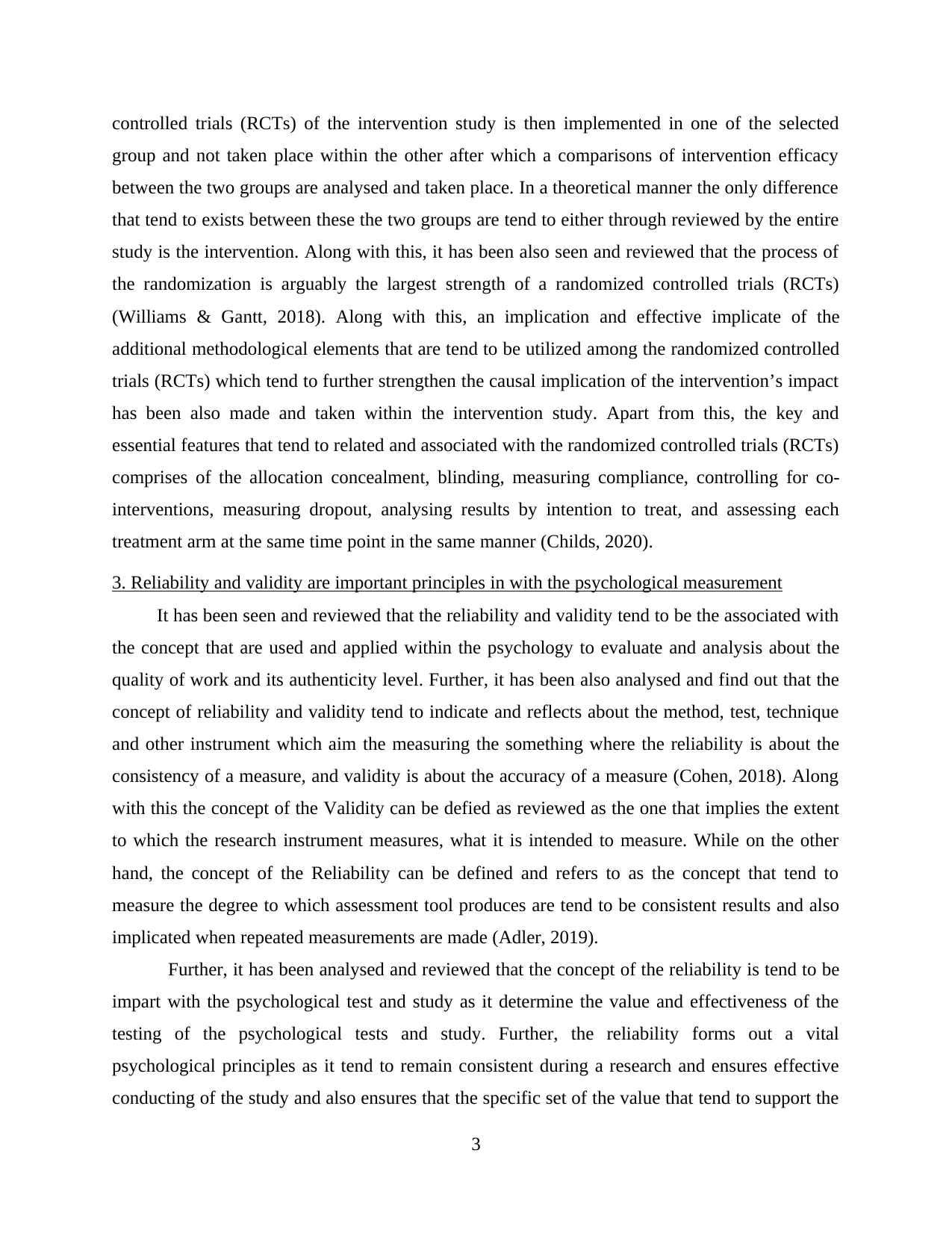
controlled trials (RCTs) of the intervention study is then implemented in one of the selected
group and not taken place within the other after which a comparisons of intervention efficacy
between the two groups are analysed and taken place. In a theoretical manner the only difference
that tend to exists between these the two groups are tend to either through reviewed by the entire
study is the intervention. Along with this, it has been also seen and reviewed that the process of
the randomization is arguably the largest strength of a randomized controlled trials (RCTs)
(Williams & Gantt, 2018). Along with this, an implication and effective implicate of the
additional methodological elements that are tend to be utilized among the randomized controlled
trials (RCTs) which tend to further strengthen the causal implication of the intervention’s impact
has been also made and taken within the intervention study. Apart from this, the key and
essential features that tend to related and associated with the randomized controlled trials (RCTs)
comprises of the allocation concealment, blinding, measuring compliance, controlling for co-
interventions, measuring dropout, analysing results by intention to treat, and assessing each
treatment arm at the same time point in the same manner (Childs, 2020).
3. Reliability and validity are important principles in with the psychological measurement
It has been seen and reviewed that the reliability and validity tend to be the associated with
the concept that are used and applied within the psychology to evaluate and analysis about the
quality of work and its authenticity level. Further, it has been also analysed and find out that the
concept of reliability and validity tend to indicate and reflects about the method, test, technique
and other instrument which aim the measuring the something where the reliability is about the
consistency of a measure, and validity is about the accuracy of a measure (Cohen, 2018). Along
with this the concept of the Validity can be defied as reviewed as the one that implies the extent
to which the research instrument measures, what it is intended to measure. While on the other
hand, the concept of the Reliability can be defined and refers to as the concept that tend to
measure the degree to which assessment tool produces are tend to be consistent results and also
implicated when repeated measurements are made (Adler, 2019).
Further, it has been analysed and reviewed that the concept of the reliability is tend to be
impart with the psychological test and study as it determine the value and effectiveness of the
testing of the psychological tests and study. Further, the reliability forms out a vital
psychological principles as it tend to remain consistent during a research and ensures effective
conducting of the study and also ensures that the specific set of the value that tend to support the
3
group and not taken place within the other after which a comparisons of intervention efficacy
between the two groups are analysed and taken place. In a theoretical manner the only difference
that tend to exists between these the two groups are tend to either through reviewed by the entire
study is the intervention. Along with this, it has been also seen and reviewed that the process of
the randomization is arguably the largest strength of a randomized controlled trials (RCTs)
(Williams & Gantt, 2018). Along with this, an implication and effective implicate of the
additional methodological elements that are tend to be utilized among the randomized controlled
trials (RCTs) which tend to further strengthen the causal implication of the intervention’s impact
has been also made and taken within the intervention study. Apart from this, the key and
essential features that tend to related and associated with the randomized controlled trials (RCTs)
comprises of the allocation concealment, blinding, measuring compliance, controlling for co-
interventions, measuring dropout, analysing results by intention to treat, and assessing each
treatment arm at the same time point in the same manner (Childs, 2020).
3. Reliability and validity are important principles in with the psychological measurement
It has been seen and reviewed that the reliability and validity tend to be the associated with
the concept that are used and applied within the psychology to evaluate and analysis about the
quality of work and its authenticity level. Further, it has been also analysed and find out that the
concept of reliability and validity tend to indicate and reflects about the method, test, technique
and other instrument which aim the measuring the something where the reliability is about the
consistency of a measure, and validity is about the accuracy of a measure (Cohen, 2018). Along
with this the concept of the Validity can be defied as reviewed as the one that implies the extent
to which the research instrument measures, what it is intended to measure. While on the other
hand, the concept of the Reliability can be defined and refers to as the concept that tend to
measure the degree to which assessment tool produces are tend to be consistent results and also
implicated when repeated measurements are made (Adler, 2019).
Further, it has been analysed and reviewed that the concept of the reliability is tend to be
impart with the psychological test and study as it determine the value and effectiveness of the
testing of the psychological tests and study. Further, the reliability forms out a vital
psychological principles as it tend to remain consistent during a research and ensures effective
conducting of the study and also ensures that the specific set of the value that tend to support the
3
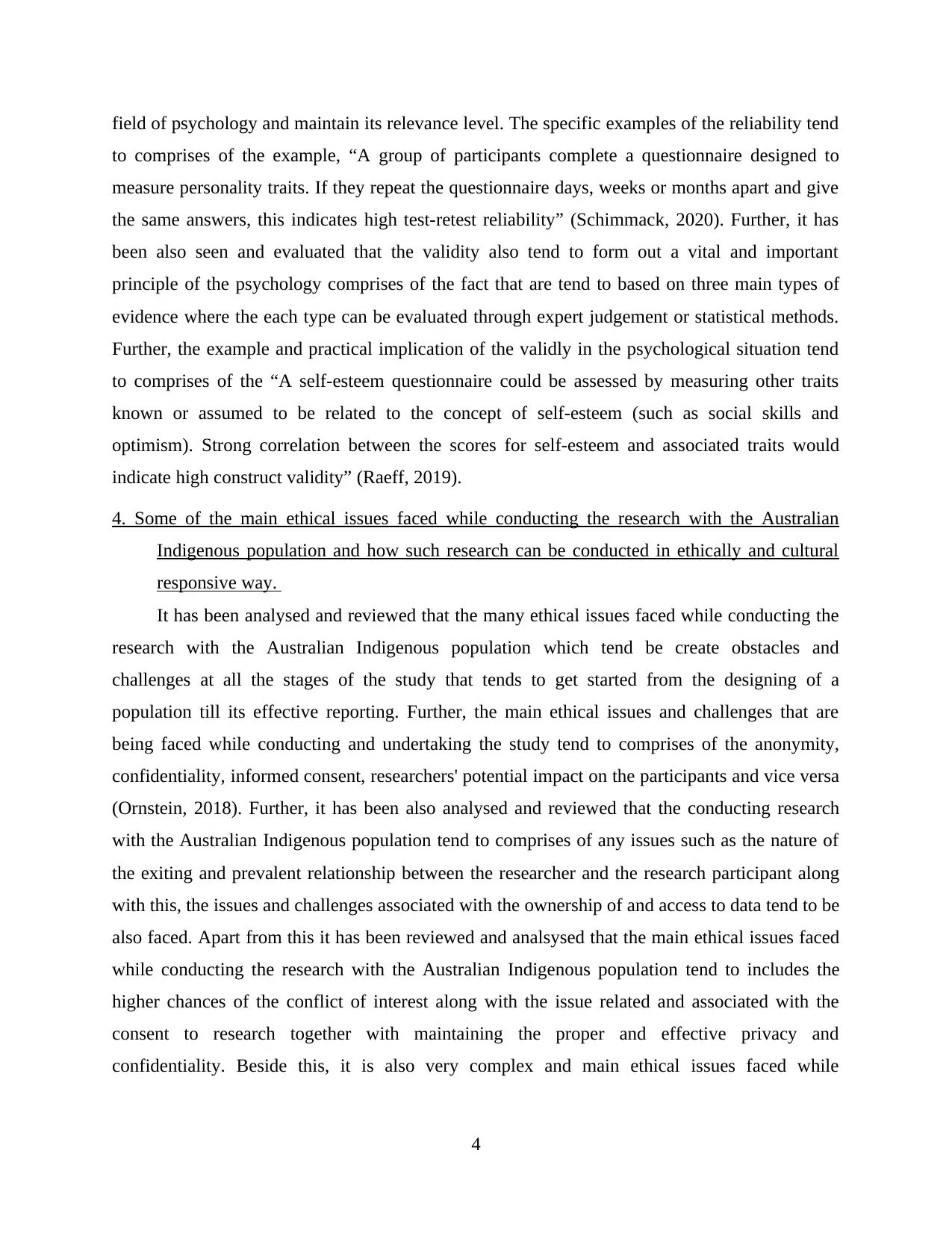
field of psychology and maintain its relevance level. The specific examples of the reliability tend
to comprises of the example, “A group of participants complete a questionnaire designed to
measure personality traits. If they repeat the questionnaire days, weeks or months apart and give
the same answers, this indicates high test-retest reliability” (Schimmack, 2020). Further, it has
been also seen and evaluated that the validity also tend to form out a vital and important
principle of the psychology comprises of the fact that are tend to based on three main types of
evidence where the each type can be evaluated through expert judgement or statistical methods.
Further, the example and practical implication of the validly in the psychological situation tend
to comprises of the “A self-esteem questionnaire could be assessed by measuring other traits
known or assumed to be related to the concept of self-esteem (such as social skills and
optimism). Strong correlation between the scores for self-esteem and associated traits would
indicate high construct validity” (Raeff, 2019).
4. Some of the main ethical issues faced while conducting the research with the Australian
Indigenous population and how such research can be conducted in ethically and cultural
responsive way.
It has been analysed and reviewed that the many ethical issues faced while conducting the
research with the Australian Indigenous population which tend be create obstacles and
challenges at all the stages of the study that tends to get started from the designing of a
population till its effective reporting. Further, the main ethical issues and challenges that are
being faced while conducting and undertaking the study tend to comprises of the anonymity,
confidentiality, informed consent, researchers' potential impact on the participants and vice versa
(Ornstein, 2018). Further, it has been also analysed and reviewed that the conducting research
with the Australian Indigenous population tend to comprises of any issues such as the nature of
the exiting and prevalent relationship between the researcher and the research participant along
with this, the issues and challenges associated with the ownership of and access to data tend to be
also faced. Apart from this it has been reviewed and analsysed that the main ethical issues faced
while conducting the research with the Australian Indigenous population tend to includes the
higher chances of the conflict of interest along with the issue related and associated with the
consent to research together with maintaining the proper and effective privacy and
confidentiality. Beside this, it is also very complex and main ethical issues faced while
4
to comprises of the example, “A group of participants complete a questionnaire designed to
measure personality traits. If they repeat the questionnaire days, weeks or months apart and give
the same answers, this indicates high test-retest reliability” (Schimmack, 2020). Further, it has
been also seen and evaluated that the validity also tend to form out a vital and important
principle of the psychology comprises of the fact that are tend to based on three main types of
evidence where the each type can be evaluated through expert judgement or statistical methods.
Further, the example and practical implication of the validly in the psychological situation tend
to comprises of the “A self-esteem questionnaire could be assessed by measuring other traits
known or assumed to be related to the concept of self-esteem (such as social skills and
optimism). Strong correlation between the scores for self-esteem and associated traits would
indicate high construct validity” (Raeff, 2019).
4. Some of the main ethical issues faced while conducting the research with the Australian
Indigenous population and how such research can be conducted in ethically and cultural
responsive way.
It has been analysed and reviewed that the many ethical issues faced while conducting the
research with the Australian Indigenous population which tend be create obstacles and
challenges at all the stages of the study that tends to get started from the designing of a
population till its effective reporting. Further, the main ethical issues and challenges that are
being faced while conducting and undertaking the study tend to comprises of the anonymity,
confidentiality, informed consent, researchers' potential impact on the participants and vice versa
(Ornstein, 2018). Further, it has been also analysed and reviewed that the conducting research
with the Australian Indigenous population tend to comprises of any issues such as the nature of
the exiting and prevalent relationship between the researcher and the research participant along
with this, the issues and challenges associated with the ownership of and access to data tend to be
also faced. Apart from this it has been reviewed and analsysed that the main ethical issues faced
while conducting the research with the Australian Indigenous population tend to includes the
higher chances of the conflict of interest along with the issue related and associated with the
consent to research together with maintaining the proper and effective privacy and
confidentiality. Beside this, it is also very complex and main ethical issues faced while
4
⊘ This is a preview!⊘
Do you want full access?
Subscribe today to unlock all pages.

Trusted by 1+ million students worldwide
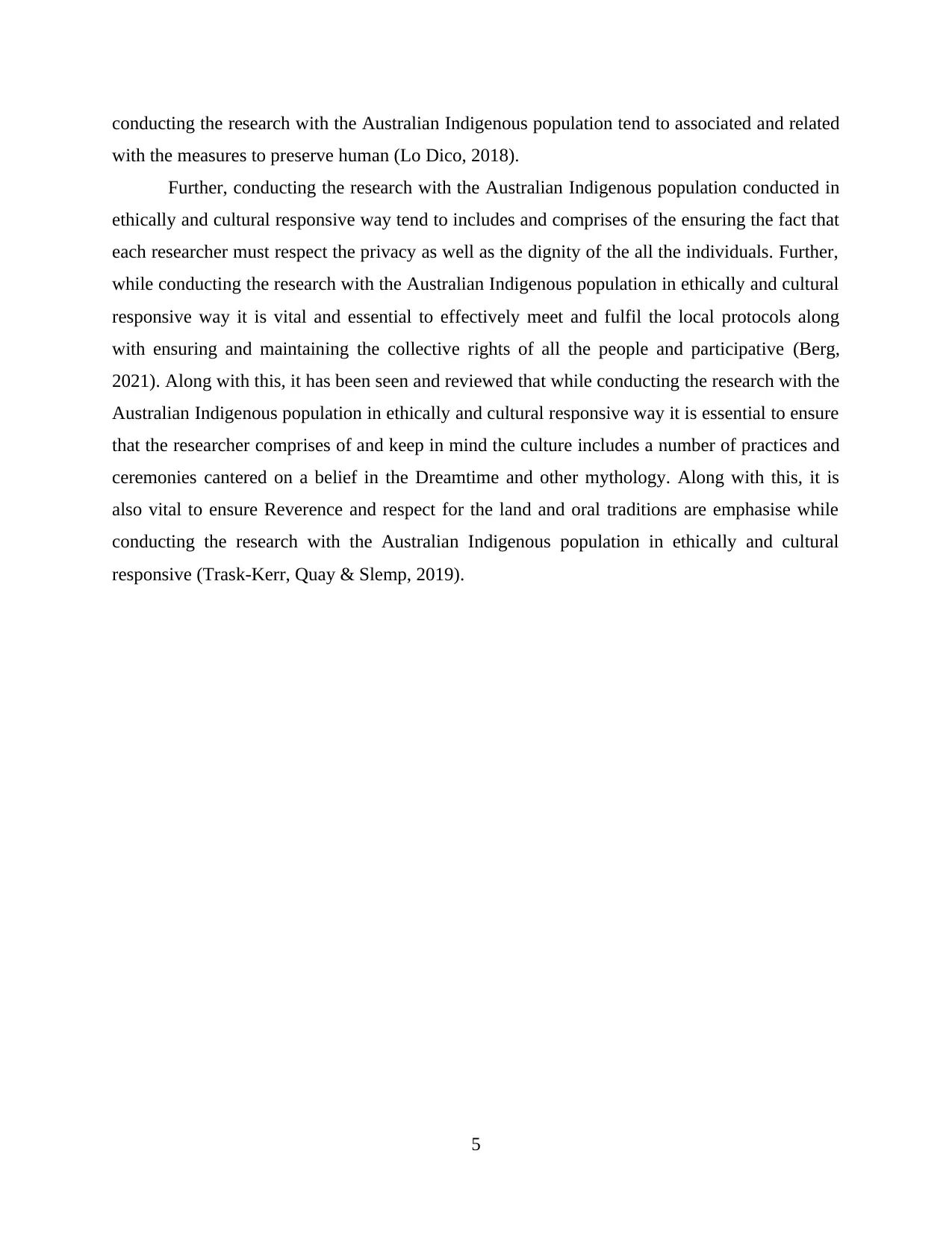
conducting the research with the Australian Indigenous population tend to associated and related
with the measures to preserve human (Lo Dico, 2018).
Further, conducting the research with the Australian Indigenous population conducted in
ethically and cultural responsive way tend to includes and comprises of the ensuring the fact that
each researcher must respect the privacy as well as the dignity of the all the individuals. Further,
while conducting the research with the Australian Indigenous population in ethically and cultural
responsive way it is vital and essential to effectively meet and fulfil the local protocols along
with ensuring and maintaining the collective rights of all the people and participative (Berg,
2021). Along with this, it has been seen and reviewed that while conducting the research with the
Australian Indigenous population in ethically and cultural responsive way it is essential to ensure
that the researcher comprises of and keep in mind the culture includes a number of practices and
ceremonies cantered on a belief in the Dreamtime and other mythology. Along with this, it is
also vital to ensure Reverence and respect for the land and oral traditions are emphasise while
conducting the research with the Australian Indigenous population in ethically and cultural
responsive (Trask-Kerr, Quay & Slemp, 2019).
5
with the measures to preserve human (Lo Dico, 2018).
Further, conducting the research with the Australian Indigenous population conducted in
ethically and cultural responsive way tend to includes and comprises of the ensuring the fact that
each researcher must respect the privacy as well as the dignity of the all the individuals. Further,
while conducting the research with the Australian Indigenous population in ethically and cultural
responsive way it is vital and essential to effectively meet and fulfil the local protocols along
with ensuring and maintaining the collective rights of all the people and participative (Berg,
2021). Along with this, it has been seen and reviewed that while conducting the research with the
Australian Indigenous population in ethically and cultural responsive way it is essential to ensure
that the researcher comprises of and keep in mind the culture includes a number of practices and
ceremonies cantered on a belief in the Dreamtime and other mythology. Along with this, it is
also vital to ensure Reverence and respect for the land and oral traditions are emphasise while
conducting the research with the Australian Indigenous population in ethically and cultural
responsive (Trask-Kerr, Quay & Slemp, 2019).
5
Paraphrase This Document
Need a fresh take? Get an instant paraphrase of this document with our AI Paraphraser
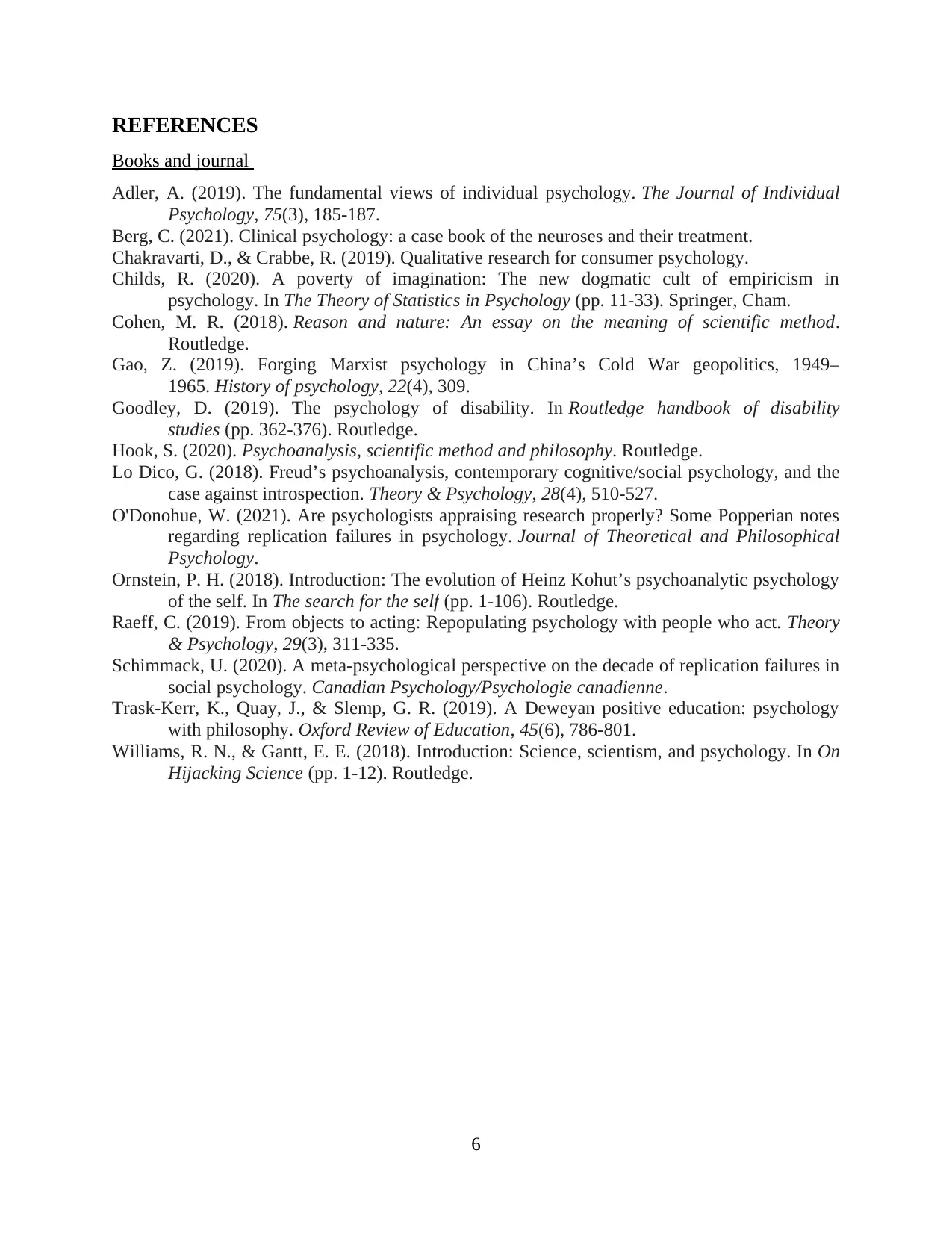
REFERENCES
Books and journal
Adler, A. (2019). The fundamental views of individual psychology. The Journal of Individual
Psychology, 75(3), 185-187.
Berg, C. (2021). Clinical psychology: a case book of the neuroses and their treatment.
Chakravarti, D., & Crabbe, R. (2019). Qualitative research for consumer psychology.
Childs, R. (2020). A poverty of imagination: The new dogmatic cult of empiricism in
psychology. In The Theory of Statistics in Psychology (pp. 11-33). Springer, Cham.
Cohen, M. R. (2018). Reason and nature: An essay on the meaning of scientific method.
Routledge.
Gao, Z. (2019). Forging Marxist psychology in China’s Cold War geopolitics, 1949–
1965. History of psychology, 22(4), 309.
Goodley, D. (2019). The psychology of disability. In Routledge handbook of disability
studies (pp. 362-376). Routledge.
Hook, S. (2020). Psychoanalysis, scientific method and philosophy. Routledge.
Lo Dico, G. (2018). Freud’s psychoanalysis, contemporary cognitive/social psychology, and the
case against introspection. Theory & Psychology, 28(4), 510-527.
O'Donohue, W. (2021). Are psychologists appraising research properly? Some Popperian notes
regarding replication failures in psychology. Journal of Theoretical and Philosophical
Psychology.
Ornstein, P. H. (2018). Introduction: The evolution of Heinz Kohut’s psychoanalytic psychology
of the self. In The search for the self (pp. 1-106). Routledge.
Raeff, C. (2019). From objects to acting: Repopulating psychology with people who act. Theory
& Psychology, 29(3), 311-335.
Schimmack, U. (2020). A meta-psychological perspective on the decade of replication failures in
social psychology. Canadian Psychology/Psychologie canadienne.
Trask-Kerr, K., Quay, J., & Slemp, G. R. (2019). A Deweyan positive education: psychology
with philosophy. Oxford Review of Education, 45(6), 786-801.
Williams, R. N., & Gantt, E. E. (2018). Introduction: Science, scientism, and psychology. In On
Hijacking Science (pp. 1-12). Routledge.
6
Books and journal
Adler, A. (2019). The fundamental views of individual psychology. The Journal of Individual
Psychology, 75(3), 185-187.
Berg, C. (2021). Clinical psychology: a case book of the neuroses and their treatment.
Chakravarti, D., & Crabbe, R. (2019). Qualitative research for consumer psychology.
Childs, R. (2020). A poverty of imagination: The new dogmatic cult of empiricism in
psychology. In The Theory of Statistics in Psychology (pp. 11-33). Springer, Cham.
Cohen, M. R. (2018). Reason and nature: An essay on the meaning of scientific method.
Routledge.
Gao, Z. (2019). Forging Marxist psychology in China’s Cold War geopolitics, 1949–
1965. History of psychology, 22(4), 309.
Goodley, D. (2019). The psychology of disability. In Routledge handbook of disability
studies (pp. 362-376). Routledge.
Hook, S. (2020). Psychoanalysis, scientific method and philosophy. Routledge.
Lo Dico, G. (2018). Freud’s psychoanalysis, contemporary cognitive/social psychology, and the
case against introspection. Theory & Psychology, 28(4), 510-527.
O'Donohue, W. (2021). Are psychologists appraising research properly? Some Popperian notes
regarding replication failures in psychology. Journal of Theoretical and Philosophical
Psychology.
Ornstein, P. H. (2018). Introduction: The evolution of Heinz Kohut’s psychoanalytic psychology
of the self. In The search for the self (pp. 1-106). Routledge.
Raeff, C. (2019). From objects to acting: Repopulating psychology with people who act. Theory
& Psychology, 29(3), 311-335.
Schimmack, U. (2020). A meta-psychological perspective on the decade of replication failures in
social psychology. Canadian Psychology/Psychologie canadienne.
Trask-Kerr, K., Quay, J., & Slemp, G. R. (2019). A Deweyan positive education: psychology
with philosophy. Oxford Review of Education, 45(6), 786-801.
Williams, R. N., & Gantt, E. E. (2018). Introduction: Science, scientism, and psychology. In On
Hijacking Science (pp. 1-12). Routledge.
6
1 out of 8
Related Documents
Your All-in-One AI-Powered Toolkit for Academic Success.
+13062052269
info@desklib.com
Available 24*7 on WhatsApp / Email
![[object Object]](/_next/static/media/star-bottom.7253800d.svg)
Unlock your academic potential
Copyright © 2020–2025 A2Z Services. All Rights Reserved. Developed and managed by ZUCOL.





